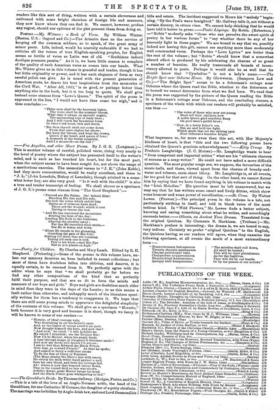Porrity. — My Witness: a Book of Versa By William Winter. (Boston,
U.S.: Osgood and Co.)—The Atlantic does us the service of keeping off the common soldiers, so to speak, of the great army of minor poets. Life, indeed, would be scarcely endurable if we had to criticise all the verses of true English-speaking peoples, for English seems as fertile of verse as Latin was of old. " Scribinms indocti doctique poemata passim." As it is, we have little reason to complain of the quality of such American verse as comes into our hands. What Mr. Winter gives us in this volume is graceful and tender, though it has but little originality or power, and it has such elegance of form as very careful polish can give. As is usual with the present generation of American poets, he draws his best inspirations from the memories of the Civil War. "After All, 1862," is as good, or perhaps better than anything else in the book, but it is too long to quote. We shall give instead some stanzas from "Love's Queen." The spirit of the poem is expressed in the line, "I would not have thee come too nigh," and it thus concludes :— "Thine eyes shall be the heavenly lights, Thy voice shall be the summer breeze, What time it sways, on moonlit nights,
The murmuring tops of leafy trees ; And I will touch thy beauteous form In June's red roses, rich and warm.
"But thou thyself shalt not come down From that pure region far above; But keep thy throne, and wear thy crown, Queen of my heart, and queen of love ! A monarch in thy realm complete, And I a monarch—at thy feet !"


































 Previous page
Previous page